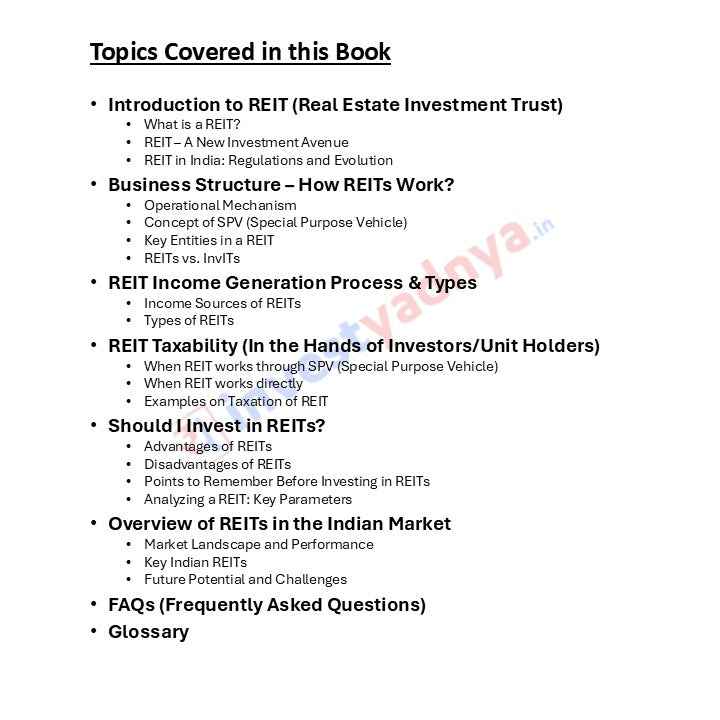Yadnya Investment Academy
REIT and its Taxation in India: An Updated Guide with examples
REIT and its Taxation in India: An Updated Guide with examples
Couldn't load pickup availability
Understanding REIT and its Taxation in India: An Updated Guide
Investing in Real Estate Investment Trusts (REITs) has become increasingly popular among Indian investors seeking attractive returns and diversification. REIT and its taxation is a crucial aspect to understand, particularly for those looking to make informed investment choices in the booming property market. This comprehensive guide offers insights into REITs, their benefits, and how they are taxed in India, ensuring you are well-equipped to navigate this investment avenue effectively.
REITs allow individuals to invest in income-generating real estate without owning the physical properties. They pool funds from multiple investors to purchase a portfolio of real estate investments, creating an opportunity for regular income via rental yields as well as the potential for capital appreciation.
Before diving into the tax implications, let's explore some essential features of REITs that make them appealing to investors:
- High Dividend Yields: REITs are mandated to distribute a significant portion of their income as dividends, offering regular income streams.
- Liquidity: Investors can buy and sell REIT shares on the stock exchange, providing greater liquidity compared to traditional real estate investments.
- Diversification: Investing in REITs spreads the risk across multiple properties and sectors, reducing the impact of individual property performance on your investments.
- Professional Management: REITs are managed by experienced professionals, freeing investors from the complexities of property management.
The Basics of REITs
Real Estate Investment Trusts (REITs) are corporations that own, operate, or finance income-producing real estate. In India, REITs have gained traction since their inception in 2014, providing a regulated avenue for investment in the real estate sector. The Securities and Exchange Board of India (SEBI) regulates REITs, ensuring investor protection and promoting transparency in operations.
Investing in REITs allows individuals to access the benefits of real estate investments without the significant capital required to purchase properties outright. As REITs cover a variety of property types, including residential, commercial, and industrial, they provide an excellent opportunity for diversifying an investment portfolio.
How REITs Work
The functioning of REITs is relatively straightforward. They attract investment from numerous shareholders to purchase, renovate, operate, or sell real estate. The revenue generated from these properties, primarily through rent or leasing, is distributed to investors in the form of dividends.
Additionally, REITs may also engage in property trading, where they buy properties at lower prices and sell them at higher valuations over time, allowing investors to benefit from both income and capital appreciation.
Taxation of REITs in India
Understanding REIT and its taxation is vital for maximizing your investment returns. In India, taxation of REITs involves two main components: taxation at the REIT level and taxation on dividends received by investors.
Taxation at the REIT Level
REITs are subject to corporate tax on their profits, similar to other companies. However, they receive certain benefits under Section 10(23F) of the Income Tax Act, which exempts them from taxation as long as they satisfy specific distribution requirements.
Taxation on Dividends
When REITs distribute dividends to their shareholders, these dividends are taxed in the hands of the investors. As per current regulations, dividends distributed by REITs are not subject to tax at the source, but they will be taxed according to the investor's applicable income tax slab rate. This means that higher-income individuals may pay a more substantial tax on dividends received compared to lower-income individuals.
Capital Gains Tax on REITs
When you sell your REIT shares, capital gains tax may come into play. In India, the tax treatment of capital gains on the sale of REIT shares depends on the holding period:
- If REIT shares are held for less than 36 months, they qualify as short-term capital assets and are taxed at a rate of 15%.
- If held for more than 36 months, gains are treated as long-term capital gains and are taxed at 20% with indexation benefits available.
Real-World Examples of REIT Investments
Consider the following scenarios to illustrate how investing in REITs can yield substantial returns while keeping tax implications in mind:
- If an investor buys units of a REIT for ₹1,000 and holds them for five years, after which they sell them for ₹1,500, they will incur long-term capital gains tax on the ₹500 profit, which is subject to a lower tax rate.
- If another investor opts for a REIT that distributes dividends during the holding period, they may receive annual dividends of ₹100. Over five years, they accumulate a 5% return, which will be taxed based on their income tax slab when received.
Why You Should Consider Investing in REITs
The growing demand for real estate investment options and the regulatory framework governing REITs enhances their attractiveness. Here's why you might want to invest in REITs:
- Passive Income: Regular dividend payments can provide a continuous income stream.
- Affordability: Unlike traditional real estate investments requiring large sums, REITs can be purchased with smaller amounts.
- Tax Efficiency: Tax regulations favor REITs in many respects, especially for long-term investors.
- Growth Opportunities: As cities expand and demand for residential and commercial properties increases, REITs are positioned to grow.
Final Thoughts
A thorough understanding of REIT and its taxation enables you to make informed investment decisions and harness the potential of the Indian real estate market. With a combination of regular income, capital appreciation, and favorable tax treatment, REITs present an attractive investment avenue.
Do not miss out on the opportunity to boost your portfolio! Explore REIT investments today and seize the chance to benefit from a lucrative and regulated sector.
For more information and updated resources on REITs and their taxation in India, feel free to browse our collection or contact our expert team for personalized advice.
Share






